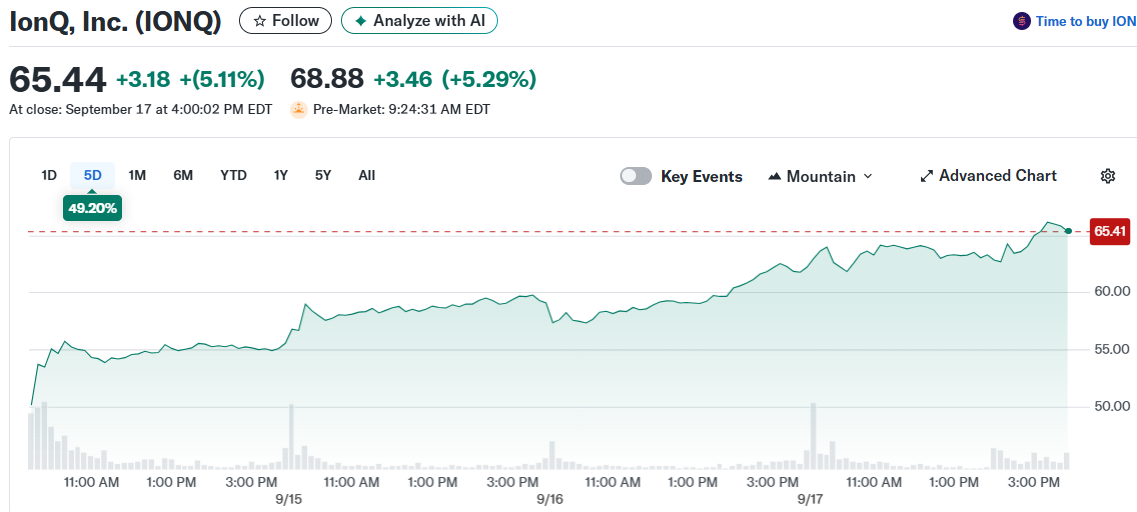TLDR
- IonQ finalized its $1.075 billion Oxford Ionics acquisition and signed deal to buy Vector Atomic for quantum sensing
- Oxford Ionics brings trapped-ion technology and UK operations base for European expansion
- Vector Atomic adds quantum sensors and atomic clocks serving defense and government clients
- Deals cement IonQ’s position as quantum computing sector consolidator with full-stack approach
- Company targets fault-tolerant quantum systems and quantum security applications through acquisitions
IonQ wrapped up another busy week of dealmaking with two major quantum technology acquisitions. The company completed its $1.075 billion Oxford Ionics purchase while announcing plans to acquire Vector Atomic in an all-stock deal.

The Oxford Ionics transaction represents IonQ’s largest acquisition to date. The deal includes $1.065 billion in IonQ shares plus $10 million cash for the UK-based quantum computing company.
Oxford Ionics specializes in trapped-ion quantum systems built on standard semiconductor manufacturing. This approach aligns with IonQ’s existing quantum computing platform and should accelerate development timelines.
The acquisition gives IonQ its first European operations center. The UK base supports expansion plans for research collaborations and commercial partnerships across international markets.
UK Technology Brings Manufacturing Edge
Oxford Ionics’ ion trap technology offers a key advantage through its use of conventional chip manufacturing processes. This could help reduce production costs as quantum systems scale commercially.
The company’s team includes quantum scientists and engineers who developed patented innovations for trapped-ion systems. These patents complement IonQ’s existing intellectual property portfolio.
Co-founders Chris Ballance and Tom Harty joined IonQ’s leadership team as part of the transaction. Their expertise in quantum hardware design strengthens IonQ’s research and development capabilities.
IonQ targets 256 high-fidelity physical qubits by 2026 through the Oxford Ionics integration. The longer-term goal aims for fault-tolerant machines with millions of qubits by 2030.
Defense Markets Drive Vector Atomic Deal
The Vector Atomic acquisition represents IonQ’s entry into quantum sensing applications. Vector Atomic develops quantum sensors, atomic clocks, and timing systems for national security markets.
The Pleasanton, California company has secured over $200 million in U.S. government defense contracts. Clients include Department of Defense programs and submarine detection systems.
Vector Atomic’s technology provides precise positioning, navigation, and timing capabilities resistant to jamming. These features appeal to military and aerospace applications where GPS signals may be unavailable.
All 76 Vector Atomic employees will join IonQ along with 29 patents covering quantum sensing technology. The deal expands IonQ’s addressable market beyond pure quantum computing applications.
IonQ CEO Niccolo de Masi highlighted quantum technology’s dual role in cybersecurity. Quantum computers could break current encryption while quantum networks enable secure communications.
The acquisitions follow IonQ’s broader consolidation strategy in quantum markets. Earlier deals included ID Quantique for quantum networking and Lightsync for quantum interconnects.
IonQ stock gained 5% Wednesday as quantum computing shares rallied sector-wide. The company has posted 57% gains year-to-date while building its acquisition war chest through recent equity raises.
The Oxford Ionics deal closed Wednesday with Vector Atomic’s transaction expected to complete pending regulatory approvals. Both acquisitions support IonQ’s vision for comprehensive quantum technology platforms serving commercial and government clients.


